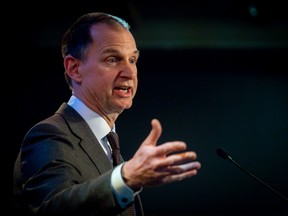The minister responsible for relations with English-speaking Quebecers promised to patch up relations in 2022.

Article content
QUEBEC — The minister responsible for relations with English-speaking Quebecers recognized Tuesday that the government’s decision to increase university tuition for out-of-province students has created dissatisfaction in the community despite its promise to patch up relations after the adoption of Bill 96.
But Eric Girard repeated he does not think it is his job to act as a lobby for the community at cabinet, only to ensure the anglophone point of view is heard.
Advertisement 2
Story continues below
Article content
Article content
He said although it has not made headlines, he and the English Language Secretariat have been working behind the scenes to improve the lives of English-speaking Quebecers. He said the government has now approved plans ensuring English-speaking Quebecers have access to health care in their language.
And he revealed the network of Senior Wellness Programs — community-run programs that help maintain the health and well-bring of English-speaking seniors — have proven to be such a success the government has added $1 million to the program for 2024-2025.
The number of programs will jump from 73 to 124 in 16 regions of Quebec, Girard said answering questions from Jacques-Cartier MNA Greg Kelley during the annual evaluation of spending by Girard’s ministry by a committee of the National Assembly.
“In this area, we have been able to do big things with small amounts,” Girard said. “We don’t measure the success of this secretariat by the noise it makes. These programs have proven their worth.”
The overall funding for the secretariat was actually increased in the last budget, Girard, who is also finance minister, told the committee. The 2024-2025 the funding will total $13.3 million.
Article content
Advertisement 3
Story continues below
Article content
But Kelley used his time in the debate to remind Girard of a promise he made to patch up relations with the English-speaking community after the adoption of controversial legislation such as Bill 96 on language and Bill 21 on state secularism.
Girard made the promise in a 2022 interview with the Montreal Gazette shortly after Premier François Legault named him to the post which Legault held himself in the first mandate of the Coalition Avenir Québec government.
It was not long after the interview that the government decided to increase university tuition for out-of-province students, a move McGill and Concordia University condemned because it put in jeopardy their finances.
Girard responded that the government tried to pitch a compromise by lowering the increase and partially exempting Bishop’s University, but he knows “the universities are still dissatisfied.”
“I am well aware,” he said before adding he cannot comment further because the matter is now before the courts.
Kelley later reminded him that there have been reports of anglophones having trouble getting services in English since the adoption of Bill 96 including being forced to wait for French death certificates before closing arrangements after the death of a loved one because an English certificate is not considered legal under Bill 96.
Advertisement 4
Story continues below
Article content
Kelley said he has heard reports of some anglophones complaining they ran into bureaucratic stonewalling at the Société de l’assurance automobile du Québec (SAAQ), which has asked some citizens to prove they had the right to be served in English.
Girard answered he believed these were “unfortunate incidents,” and repeated anyone who was getting services in English before the adoption of Bill 96 is entitled to the same services today.
“It is not our intention to not provide services to citizens,” Girard said.
The Québec solidaire member of the committee, Alejandra Zaga Mendez, returned to a theme that dominated last year’s spending hearings: the high unemployment rate of English-speaking Quebecers compared with francophones.
A 2023 study produced by the Provincial Employment Roundtable (PERT) revealed while the unemployment rate for francophones was 6.9 per cent, it was 10.9 per cent for English-speaking Quebecers. It is even higher in regions like the Gaspé and North Shore (18.7 per cent).
As he did last year, Girard said he hopes the situation changes as the economy improves but said the secretariat is working with community groups to boost access to help services for anglophones.
“We have to do more,” Girard said in reference to anglophone unemployment. “In the current economy (with labour shortages) we need everybody. Anglophones are part of it. It’s in the superior interests of Quebec.”
He conceded, however, the number of English-speakers working in the public sector remains a dismal one per cent.
He noted he himself tried to hire an anglophone to work in his finance ministry but failed, to which Kelley said there are plenty of top McGill and Concordia finance majors who would be willing to work.
In the same hearing process last year, Girard said he wanted to hear fresh ideas on how to improve the diversity of the public sector.
Recommended from Editorial
Advertisement 5
Story continues below
Article content
Article content


Comments